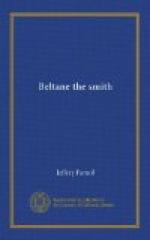Beyond the confines of this great and goodly camp the lists had been formed, and here from earliest dawn a great concourse had been gathering; villein and vassal, serf and freedman from town and village: noble lords and ladies fair from castle hall and perfumed bower, all were here, for to-day a witch was to die—to-day, from her tortured flesh the flame was to drive forth and exorcize, once and for all, the demon who possessed her, by whose vile aid she wrought her charms and spells. So country wenches pushed and strove amid the throng, and dainty ladies leaned from canopied galleries to shudder with dread or trill soft laughter; but each and every stared at one who stood alone, ’twixt armed guards, so young and fair and pale within her bonds, oft turning piteous face to heaven or looking with quailing eye where stake and chain and faggot menaced her with awful doom. And ever the kindly sun rose high and higher, and ever the staring concourse grew.
Now, of a sudden the clarions rang out a point of war, and all voices were hushed, as, forth into the lists, upon his richly-caparisoned charger, my lord Duke Ivo rode, followed by his chiefest lords and barons; and as he rode, he smiled to himself full oft as one that meditates a hidden jest. Being come where the witch stood, her disordered garments rent by vicious handling, striving to veil her beauty in her long, dark hair, my lord Duke reined in his pawing steed to sit a while and look down at her ’neath sleepy lids; and, ever as he looked, his arching nostrils fluttered above curling lip, and ever he fingered his long, blue-shaven chin.
“Alack!” cried he at last, “’tis a comely wench, and full young, methinks, to die so soon! But witchcraft is a deadly sin, abhorred by man and hateful unto God—”
“My lord—my lord,” spake the witch swift and passionate yet trembling ’neath his sleepy gaze, “thou knowest I am no witch indeed—thou knowest—”
“Nay, nay,” quoth the Duke, shaking his head, and coming more near he stooped and spake her, low-voiced, “nay, she thou would’st name was a lady proud, soft and white, with hair bright and glorious as the sun— in sooth a fair lady—yet something too ambitious. But thou, though of her size and shape, art of a dark and swarthy hue and thy hair black, meseemeth. Of a verity thou art only the witch Mellent, and so, by reason of thy sun-browned skin and raven hair—aye, and for thy witchcraft—thou, alack! must die—unless thou find thee a champion. Verily I fear me no man will dare take up thy cause, for Sir Gilles is a lusty man and famous at the joust. Moreover—my will is known in the matter, so do I fear there none shall come to fight on thy behalf. Alack! that one should die so young!”
“Ah, my lord—my lord Ivo,” she whispered, eager and breathless, “show me a little mercy. For that, to be thy Duchess, I denied thee thy desire in the past, let me now be prisoned all my days, an it be thy will—but give me not to the fire—ah, God—not the fire! Pity—pity me for what I did for thee—be merciful—”




